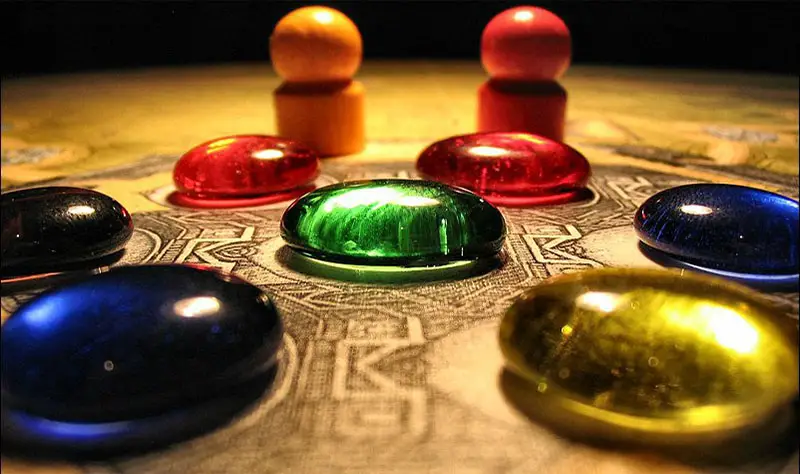
Shorter Playing Time Variant
The players only receive 6 Palaces.
The max number of game turns is 8.
Advanced Version 1
-
Yogi and Action chits are added.
-
Function of Yogi:
- Receive 1 Action chit during his turn.
- May use immediately or in later turn, even if the player does not have Yogi.
-
Function of Action chits:
- Allows a player a third action during his player turn.
- Select an action from the ones on the action disc.
- Simply declares and conduct it EXCEPT the action Character card may not be selected with this additional action.
- Only 1 Action chit per player turn may be used.
- After use, the Action chit is returned to the bank.
-
When playing with less than 5P, at the start of the game, place 1 Outer Palace of each unused color in each City.
-
Before the start of the game, the Character cards are auctioned off:
- The youngest player bids 0,1 or more money for the right of first choice of a character card.
- Clockwise, players overbid or pass.
- Bidders who pass drop out.
- The last and highest bidder pays the bank and chooses a character.
- The process is repeated among the remaining players, until only 1 player is left.
- He gets a character for free.
- If a player bids 0 and all other players pass, he also gets the character for free.
-
Each Character has a home city which shows his image. The player who has the corresponding character of a scoring city gets an additional point even if he scores no further points.

Advanced Version 2
-
A player may have more than 1 character card.
-
A player holding several character cards may use the special powers of all of these characters.
-
A player selecting Character card on his action disc chooses and receives a character from the bank. He does not return one.
-
If there are no characters left in the bank, the player with the action character card may exchange a character with another player or entice one away from him:
The player conducting his player turn names another character card. The owner of that card has to give him that card and receives a card in exchange. If the player conducting his player turn has several character cards, he may select the card that he gives in return.
The player conducting his player turn can only entice away a card if he has less character cards than the targeted player. That player chooses a character and gives it to the enticing player. He does not receive a character in return. The enticing player has no say in which character he gets.
-
The lowest numbered character card of each player determines the order of the player turns. The player with the lowest character card is the first player, followed by the player with the second-lowest card.
-
Each player has only one player turn.
If there is a tie during scoring, the player with the lowest ranking character card breaks the tie and gets more money.
Continue Reading
